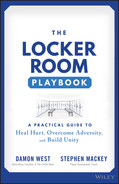12
Team Meeting
For Everyone
Core Lessons
- Leaders step up to do what is right even when they're scared.
- Everyone deserves to have their voice heard, even if you disagree with what they have to say.
Chapter Summary
Coach Smitty informs the team that they will be “practicing” in the locker room. He goes on to say that he mishandled the Davey situation, and he apologizes to the team. He also apologizes to Coach Washington for ignoring his advice to handle the matter openly. He reiterates his apology to Marcellus so the entire team knows that he recognizes he treated him badly. The football becomes a microphone for everyone to have their turn to speak so that the team can begin to heal the hurts of the broken locker room.
Deep Dive Teaching
At its simplest, integrity is calling right, right and wrong, wrong.
At the beginning of this story, Marcellus did what Coach Smitty had trained his team to do: he saw wrong and he called it out. But Coach Smitty was not able to accept that at the time. Over the course of the story, Coach Smitty comes to see the error he made. He did not act with the same integrity that Marcellus showed. But in this chapter he has seen the error and is, himself, using his integrity to call wrong, wrong.
It's not easy to call out others when they are wrong. It's not easy to be the only one standing up saying “This is not right,” when everyone else is just going with the flow. When push comes to shove, it's not easy to demonstrate integrity.
And sometimes, as happened to Marcellus, others will shut us down when we call right, right or wrong, wrong. But integrity demands that we speak up regardless of how the message is received. If others shut you down when your integrity has you speaking the truth, don't be discouraged. Don't let that silencing be the end of the story.
It's scary to behave with integrity. It's scary to speak up when everyone else is shutting up. And it's scary to admit when you have been wrong. There's nothing wrong with being scared. But there is something wrong with not finding the courage to press forward anyway.
Right is right and wrong is wrong. Integrity knows the difference and speaks up about it.
For the Individual
My Key Takeaways
Journal Questions
- What does integrity mean to you?
- What's an example of a time when you acted with integrity?
- What about an example of a time when you did not act with integrity?
- How did you know that right was right and wrong was wrong in these situations?
- What led you to act the way that you did?
Exercise
Mindful Meditation
- Set a timer for 5 to 10 minutes.
- Find a place to sit comfortably, either in a chair or on the floor. Place one hand over your heart and the other over your gut.
- Take a few slow, deep breaths and try to settle into your skin.
- Let your breath even out to a natural rhythm and just sit until the timer goes off.
Okay, don't just sit. Here are six things you can do while you're sitting there:
- Listen to the sounds of the room or the world outside.
- Listen to your breathing.
- Feel your heartbeat.
- Feel your gut and what's going on inside.
- Notice which thoughts try to steal your attention.
- Notice the way those thoughts affect your heart and your gut.
For the Team
Discussion Questions
- Why is integrity an important character trait for your team?
- How does your integrity impact your contribution to the team?
- What are some rules that would be useful for a potentially heated team discussion?
- Why is it important to listen to your teammates' thoughts and feelings, even if you disagree with them?
- What is the elephant in the room that your team needs to discuss?
Exercise
Two Facts and a Lie
- Each team member writes down two things that are true and one thing that is a lie.
- Traditionally, this team-building game is played as a “getting-to-know-you” exercise, and players write down personal facts for their truths and lies. In this case, the goal is to open up further discussion about integrity; therefore, players will instead write down two general facts that they know to be true and one that they know to be false.
- Players will take turns reading their three facts. The other players can then ask up to three questions to get clues that point to which is the false statement. The player reading the facts does not have to answer these questions truthfully. In other words, they can try to come up with convincing lies to get people to guess incorrectly.
- On sheets of paper, players will write down which statement they think is the false one beside each person's name.
- For each false statement they identify, players get one point. In addition, players get one point for each person who incorrectly identifies one of their truths as a lie. The winner is the person with the most points.
- Follow up this exercise with a discussion about what it felt like to lie, how they could tell others were lying or telling the truth, and why truth and integrity matter.
Notes
